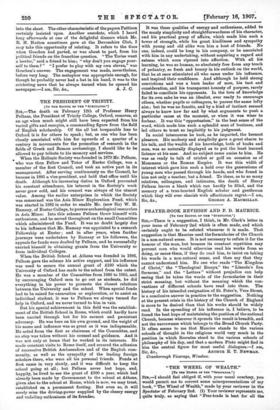PRAYER-BOOK REVISION AND F. D. MAURICE. [To TON EDITOR OP
THE "seserrroroi Sur,—There is a suggestion, I think, in Mr. Clark's letter in your issue of February 2nd which is often made, and which certainly ought to be refuted whenever it is made. That suggestion is that Maurice used the formularies of the Church in a non-natural sense. It is not necessary to refute it for the honour of the man, but because its constant repetition may prevent men who would otherwise read his works from so doing, or cause them, if they do read him, to insist on taking his words in a non-natural sense, and then say that they cannot understand him. No one who reads "The Kingdom of Christ," the "Theological Essays," the "Lincoln's Inn Sermons," and the " Letters " without prejudice can help seeing that he takes the words of the formularies in their strict meaning, but without the meaning which the con- ventions of different schools have read into them. The history of his intended resignation of St. Peter's, Vere Street, is a conclusive answer in practice to the suggestion. Nothing at the present crisis in the history of the Church of England is more to be desired than that his works should be widely read. In the spreading of his influence is, I believe, to be found the best hope of maintaining the position of the national Church, because wherever it spreads the result is breadth, and not the narrowness which belongs to the Broad Church Party. It often seems to me that Maurice stands to the various schools of thought in the religious world very much in the position in which Socrates stood to the various schools of philosophy of his day, and that a modern Plato might find in him the central figure for most useful dialogues.—I am,






































 Previous page
Previous page